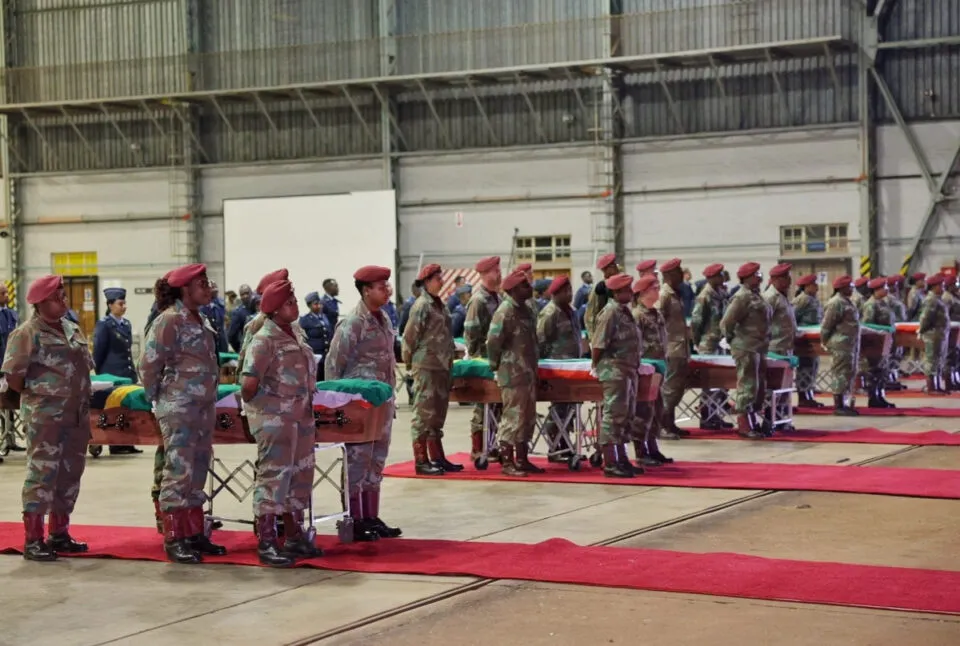
Government recovers remains of 49 liberation fighters who died while in exile
The South African government has recovered the remains of 49 liberation fighters who lost their lives while in exile in Zimbabwe and Zambia.

The South African government has taken custody of the remains of 49 liberation fighters who passed away while in exile in Zimbabwe and Zambia.
The remains were received at the Waterkloof Airforce Base on an emotional Wednesday evening, 25 September for families of the fallen freedom fighters.
Moment of sombre reflection
Speaking to SAnews, Minister of Defence and Military Veterans, Angie Motshekga, said the handover of the remains was a moment of sombre reflection on the sacrifices it took for South Africa to gain its freedom.
“The message is of gratitude to… families who have daughters, sons, fathers and mothers who gave the ultimate price for our freedom. We are able to be here because they gave the final sacrifice.
“It is also for us as a people, to remember where we came from because this didn’t come easy. There are people who died, and we should not be casual about how we use that power because it is a power that came from people who gave their lives,” Motshekga said.
The Minister added that the repatriation of struggle heroes will continue as there are more struggle heroes who died outside of the country.
“The plan is to now do mass repatriations and that’s what has been in the plans for the past two years. But because it takes time, we’ll see if we can do it in gaps of two years. This has been a good lesson in terms of mass repatriations and when we move to other countries… we will have learnt the lessons on how to deal with most of the issues,” she said.
Families remember their heroes
The remains of freedom fighter Basil February – who died in Zimbabwe – arrived with the cohort.
Speaking to SAnews, his brother Terry said the return of his remains marks the beginning of healing for the family.
“My mother died 11 years ago and… I would like my mother to have been here. I would have liked for this occasion to have happened 12 or 15 years ago, so that she could have been here. My mother died when she was 92 years old. She asked me to make her a promise that I will bring Basil’s remains home and I said I will. Today is such a historic day for our family.
“It does not yet bring closure. It will take a little while. This whole process has opened some old, deep wounds and it will take a while for those wounds to heal.
“But I can feel that the process has already started. That closure is starting to kick in. I feel a relief and I feel a genuine excitedness because Basil is finally coming home,” February said.
Onica Mahlangu – whose brother Bennet Sibanyoni died in Zambia nearly 40 years ago – described to SAnews, the peacefulness that her brother’s remains brings as the brutal Apartheid security forces took everything that belonged to him – leaving them with nothing to remember him by.
“I have mixed emotions. I feel like this is the first time I have been informed of his death. That’s how much it still hurts. Unfortunately, my mother died with a broken heart… crying for her son. She pleaded with us not to stop searching for his remains. I feel happy that government has not forgotten us and has helped us.
“The repatriation will bring peace to our spirits… our family was tortured. We didn’t even have a photo of him because the Apartheid government took everything that belonged to him and left us with nothing that we could look at and remember him by,” Mahlangu said.
Makabelo Msiza remarked to SAnews that without government, they would not have been able to bring her brother home.
“I am filled with joy because we finally have my sibling back. I know where I will bury him and even when I miss him, I will now know where to go to visit him at his gravesite. I will bury him near my parents’ graves.
“President [Cyril] Ramaphosa has done such a big thing for us. I have been on this road [of trying to get the remains] since Mandela was alive. I have knocked on many doors with no help but today, because of President Cyril Ramaphosa, everything has now been resolved and we can bury our loved ones in peace,” Msiza said.
Cyril Ramaphosa to lead a repatriation and restitution ceremony
President Ramaphosa is expected to lead a repatriation and restitution ceremony for the remains at the Freedom Park Heritage Site and Museum in Tshwane on Friday.
In a statement on Monday, the Government Communication and Information System (GCIS) said that following the arrival of the remains, government will host the official homecoming ceremony to mark the return of these liberation fighters to the country of their birth.
“Thereafter, reburial ceremonies will be held in the provinces of their origin, ensuring they are laid to rest with the dignity and respect they deserve,” said the GCIS.
The Exile Repatriation Programme is guided by the National Policy of Repatriation and Restitution of Human Remains and Heritage Objects of 2021. This policy was adopted as part of South Africa’s broader commitment to ensuring that former liberation fighters who died in exile are returned home and buried with dignity.
The repatriation process is being conducted in close collaboration with regional governments, historical experts, and local communities to guarantee a respectful and well-coordinated return.
